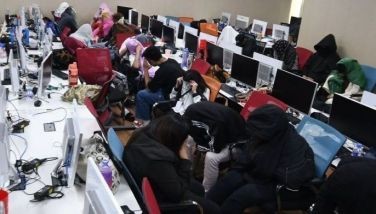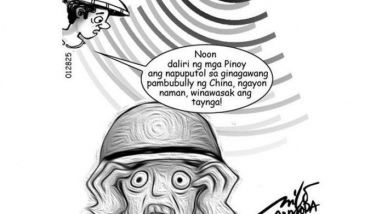Cha-cha advocacy group urged to present pros, cons
February 9, 2006 | 12:00am
They should tell all sides of the story.
The 15-member Charter Change Advocacy Commission should also present the shortcomings of the proposed amendments to the 1987 Constitution, a former commissioner of the consultative commission (con-com) on Charter change said yesterday.
"This is a basically a sales team. They will really try to sell the idea of Charter change to the people. But the people need to be really informed. They should have somebody who will also present the shortcomings (of the proposed Charter amendments)," former con-com commissioner Rene Azurin said.
Meanwhile, local executives from Eastern Samar led by Gov. Ben Evardone kicked off Monday a campaign to gather nationwide support for a people’s initiative to push for Charter change, in a move which they believe reflects the sentiment of a majority of Filipinos in the country’s 78 other provinces.
In a massive display of unity they dubbed "LGU Power," the local officials trooped to Manila to press for a shift from a presidential form of government to a unicameral, parliamentary system because the current bicameral congress is already "irrelevant."
Azurin also said that if the members of the Charter Change Advocacy Commission are really bent on educating the people about Charter change, they should also hold public debates on both the good and bad sides of the proposals.
"I think the intention to educate the public (on Charter change) is good." he said. "They should also have full-scale debates. But if it will be just advocacy work to push for the proposed shift to a parliamentary form of government, then it would not be a wise use of public funds. They will really not inform the public on the disadvantages."
Azurin, who was part of the so-called "minority bloc" of con-com commissioners who were against the shift to a parliamentary-federal form of government, also expressed fear that scandals like the P728-million fertilizer fund scam that were committed under a presidential system with checks and balances, will be easier to commit and conceal in a parliamentary system of government.
"The fertilizer scam and cover-up is an example of what can be done within a system with checks and balances," Azurin said, "what more in a system without such checks?"
"We need to tighten the controls, not relax them. We must improve the justice system and limit government powers. That should be the direction of Charter change," he said.
Azurin said scandals like the fertilizer fund scam would be easier to conceal from the public as the executive and legislative branches of government are fused, as is the case under a parliamentary system of government.
The Charter Change Advocacy Commission was created on Jan. 24 by virtue of Executive Order 359.
Lito Monico Lorenzana, former con-com secretary general and now chair of the advocacy commission earlier said that this new commission will be composed of experts on the Constitution and former con-com commissioners.
Lorenzana also said that the advocacy commission will focus on the Charter amendment proposals on the shift to a parliamentary system of government, electoral system reforms and the promotion of socio-economic development.
Meanwhile, Eastern Samar’s local officials, led by Evardone, said that "practically 100 percent of the local government units in Eastern Samar are backing the proposal to amend the Constitution through a people’s initiative."
Evardone said all 23 municipalities in Eastern Samar, one of the country’s poorest provinces, adopted municipal resolutions urging Malacañang and Congress to revise the 1987 Constitution through a direct popular initiative as provided for in the Charter.
He and other Eastern Samar local executives seek a people’s initiative for Charter change though there is no enabling law that permits the implementation of this constitutional provision.
Evardone also said the Union of Local Authorities of the Philippines (ULAP) and the League of Provinces have already expressed support for the process of a people’s initiative as the most viable and popular route to pave the way for constitutional reform.
He said Eastern Samar local executives are pushing for constitutional reform primarily to transform the present system of government to a unicameral, parliamentary form. — Mike Frialde, Perseus Echeminada
The 15-member Charter Change Advocacy Commission should also present the shortcomings of the proposed amendments to the 1987 Constitution, a former commissioner of the consultative commission (con-com) on Charter change said yesterday.
"This is a basically a sales team. They will really try to sell the idea of Charter change to the people. But the people need to be really informed. They should have somebody who will also present the shortcomings (of the proposed Charter amendments)," former con-com commissioner Rene Azurin said.
Meanwhile, local executives from Eastern Samar led by Gov. Ben Evardone kicked off Monday a campaign to gather nationwide support for a people’s initiative to push for Charter change, in a move which they believe reflects the sentiment of a majority of Filipinos in the country’s 78 other provinces.
In a massive display of unity they dubbed "LGU Power," the local officials trooped to Manila to press for a shift from a presidential form of government to a unicameral, parliamentary system because the current bicameral congress is already "irrelevant."
Azurin also said that if the members of the Charter Change Advocacy Commission are really bent on educating the people about Charter change, they should also hold public debates on both the good and bad sides of the proposals.
"I think the intention to educate the public (on Charter change) is good." he said. "They should also have full-scale debates. But if it will be just advocacy work to push for the proposed shift to a parliamentary form of government, then it would not be a wise use of public funds. They will really not inform the public on the disadvantages."
Azurin, who was part of the so-called "minority bloc" of con-com commissioners who were against the shift to a parliamentary-federal form of government, also expressed fear that scandals like the P728-million fertilizer fund scam that were committed under a presidential system with checks and balances, will be easier to commit and conceal in a parliamentary system of government.
"The fertilizer scam and cover-up is an example of what can be done within a system with checks and balances," Azurin said, "what more in a system without such checks?"
"We need to tighten the controls, not relax them. We must improve the justice system and limit government powers. That should be the direction of Charter change," he said.
Azurin said scandals like the fertilizer fund scam would be easier to conceal from the public as the executive and legislative branches of government are fused, as is the case under a parliamentary system of government.
The Charter Change Advocacy Commission was created on Jan. 24 by virtue of Executive Order 359.
Lito Monico Lorenzana, former con-com secretary general and now chair of the advocacy commission earlier said that this new commission will be composed of experts on the Constitution and former con-com commissioners.
Lorenzana also said that the advocacy commission will focus on the Charter amendment proposals on the shift to a parliamentary system of government, electoral system reforms and the promotion of socio-economic development.
Meanwhile, Eastern Samar’s local officials, led by Evardone, said that "practically 100 percent of the local government units in Eastern Samar are backing the proposal to amend the Constitution through a people’s initiative."
Evardone said all 23 municipalities in Eastern Samar, one of the country’s poorest provinces, adopted municipal resolutions urging Malacañang and Congress to revise the 1987 Constitution through a direct popular initiative as provided for in the Charter.
He and other Eastern Samar local executives seek a people’s initiative for Charter change though there is no enabling law that permits the implementation of this constitutional provision.
Evardone also said the Union of Local Authorities of the Philippines (ULAP) and the League of Provinces have already expressed support for the process of a people’s initiative as the most viable and popular route to pave the way for constitutional reform.
He said Eastern Samar local executives are pushing for constitutional reform primarily to transform the present system of government to a unicameral, parliamentary form. — Mike Frialde, Perseus Echeminada
BrandSpace Articles
<
>
- Latest
- Trending
Trending
Latest
Trending
Latest
Recommended
































